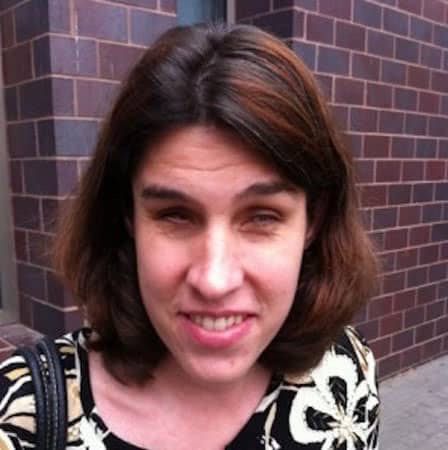Since 1999, Knowbility has advocated for an internet that is accessible to all people, including those with disabilities. When websites and mobile applications are made accessible, people with disabilities have the chance to become more socially and economically integrated into broader society. In keeping with its mission, Knowbility has a proven track record of employing people with disabilities and equipping them with the knowledge and skills to pursue meaningful careers in the field of web accessibility and beyond. This profile highlights the example of Desiree Sturdevant, who worked as an accessibility specialist for Knowbility. Her story offers lessons for other organizations that wish to employ college-educated people with disabilities.

Desiree was born with microphthalmia, a genetic condition in which the eyes are abnormally small. Since childhood, she read large-print books in school, and after her vision deteriorated further, she began learning braille. Since the age of 13, she has been a braille reader. She grew up in Utah and moved to Austin, Texas in 1992. She attended high school there and graduated from the University of Texas at Austin with a degree in music in 2000. She worked a series of customer service call center jobs for several years until the birth of her first daughter in 2004.
In 2005, she became aware of Knowbility through its OpenAIR accessibility and web design hackathon, one of Knowbility’s community programs. Desiree connected with Executive Director Sharron Rush, and soon after began working as a contractor, assisting with accessibility audits. Knowbility provides accessibility testing and training services, and Desiree’s firsthand experience with assistive technology made her a good fit for this kind of work.
Desiree enjoyed the work and wanted to work with Knowbility, both as a way to maintain a strong resume and keep up her tech skills. In 2008, when her first daughter began preschool, Desiree started working part-time. She presented accessibility demos, wrote for Knowbility’s blog, took meeting minutes, and continued providing expert input for Knowbility’s audits. She also refined her technical skills with screen readers, braille personal digital assistants, and smartphones.
“For me, it was a chance to get out there, keep my work skills up, and still mostly be a stay-at-home mom,” she said. “Being on staff, a little extra money, it was good, but the flexibility that I needed to stay home and be with my daughter, it was really what I was all about at the time, and they were really supportive of it at Knowbility for me to do that.”
While being adaptable to an employee’s family commitments is an admirable quality of a great employer, it becomes a true necessity for many disabled employees, especially those who are beginning to raise a family and depend on public transportation. When Desiree first started with Knowbility, rideshare services such as Uber and Lyft did not exist, and taxi fares were prohibitively expensive. Thus, Desiree needed to use paratransit on days when she was needed in the office. Paratransit rides are door-to-door shared rides, and in most cities need to be booked a day in advance.
From 2008-2011, Desiree worked part-time for Knowbility. She took time off upon the birth of her second daughter, but she continued to present assistive technology demos at John Slatin AccessU, Knowbility’s annual web accessibility conference, and participate in large accessibility testing projects. Desiree’s experience demonstrates that being part of a mission-driven team with leadership that encourages professional growth will increase the chance of further substantial employment.
Knowbility really offered me lots of opportunities to learn several different skills: training, teaching, demoing, and the energy for the cause for accessibility.
Along with leadership however, flexibility in working arrangements complements Knowbility’s formula for success for people with disabilities. As Desiree noted, being able to work from home proved beneficial for her and her family.
“I do think that flexibility has to be there because not everybody can work from an office,” she said. “It’s transportation issues. If they [disabled people] have motor disabilities, it’s really difficult for them to get out of their houses sometimes, but they still want to interact with society.”
As the technology that allows for remote work becomes more affordable and user-friendly, providing a flexible schedule in which employees work partially or entirely from home will continue to make economic sense and allow for people with disabilities to maximize their potential.
In April 2018, Desiree began working full-time with Pearson. As a Senior Blindness Technology Specialist, Desiree will advise Pearson’s developers and designers on ways to make their web products accessible. Pearson has a large presence in the education market, and Desiree’s vast wealth of knowledge will be a great asset to the company. Desiree’s work ethic and curiosity combined with the tech skills she’s learned over the years have allowed her to fulfill her potential. Her desire to contribute to her community and the good fortune of having worked with people who encouraged her to perform at a high level have put her on a path towards career success. Employees who wish to have dedicated workers should focus their attention on the millions of highly educated disabled Americans who want to be part of mainstream society.
“If the person really wants the job, they’re going to work hard for it,” she said. “They’re going to do the best they can for that job because people want to feel useful. They want to feel needed. They want to feel productive.”
